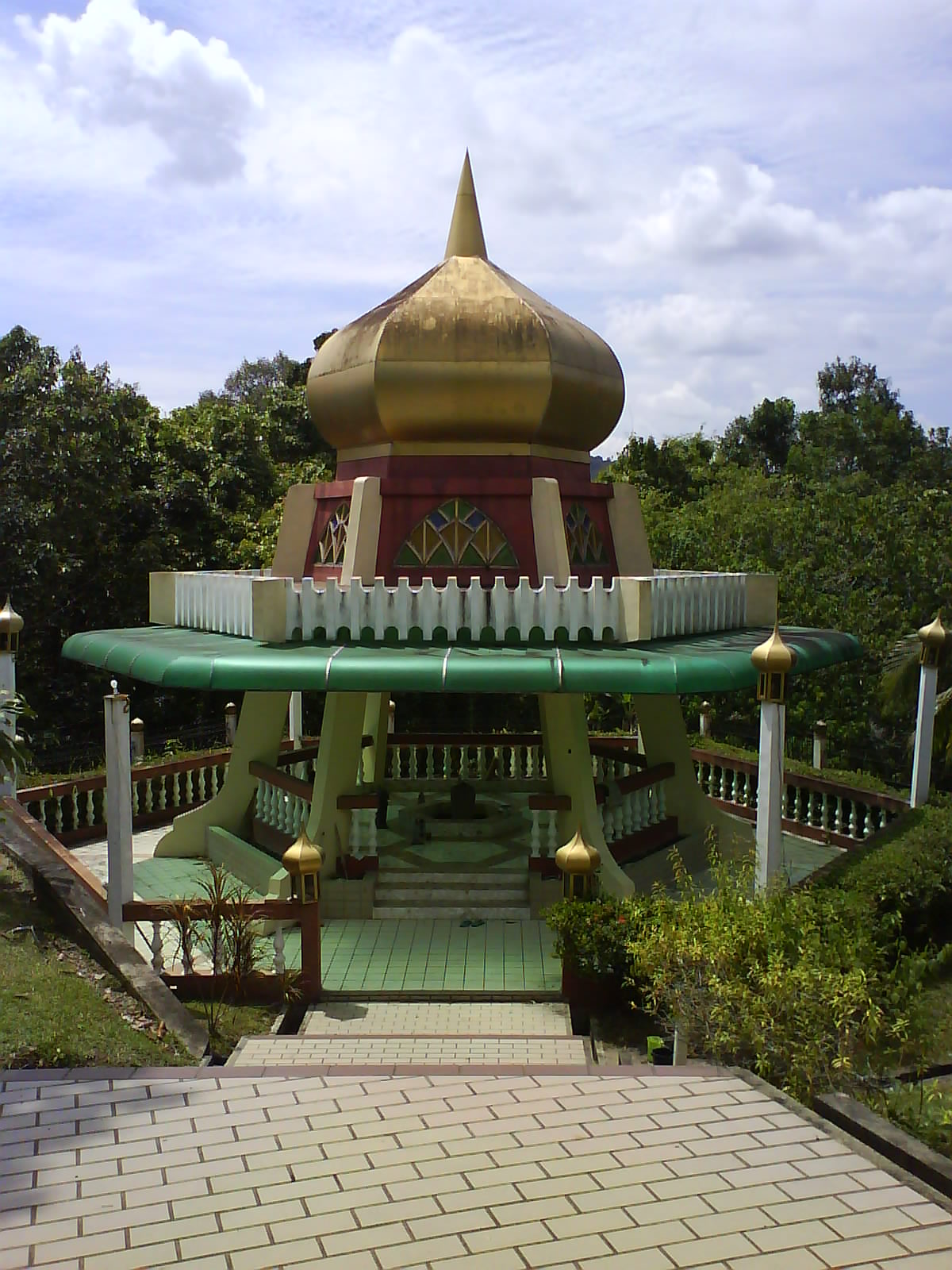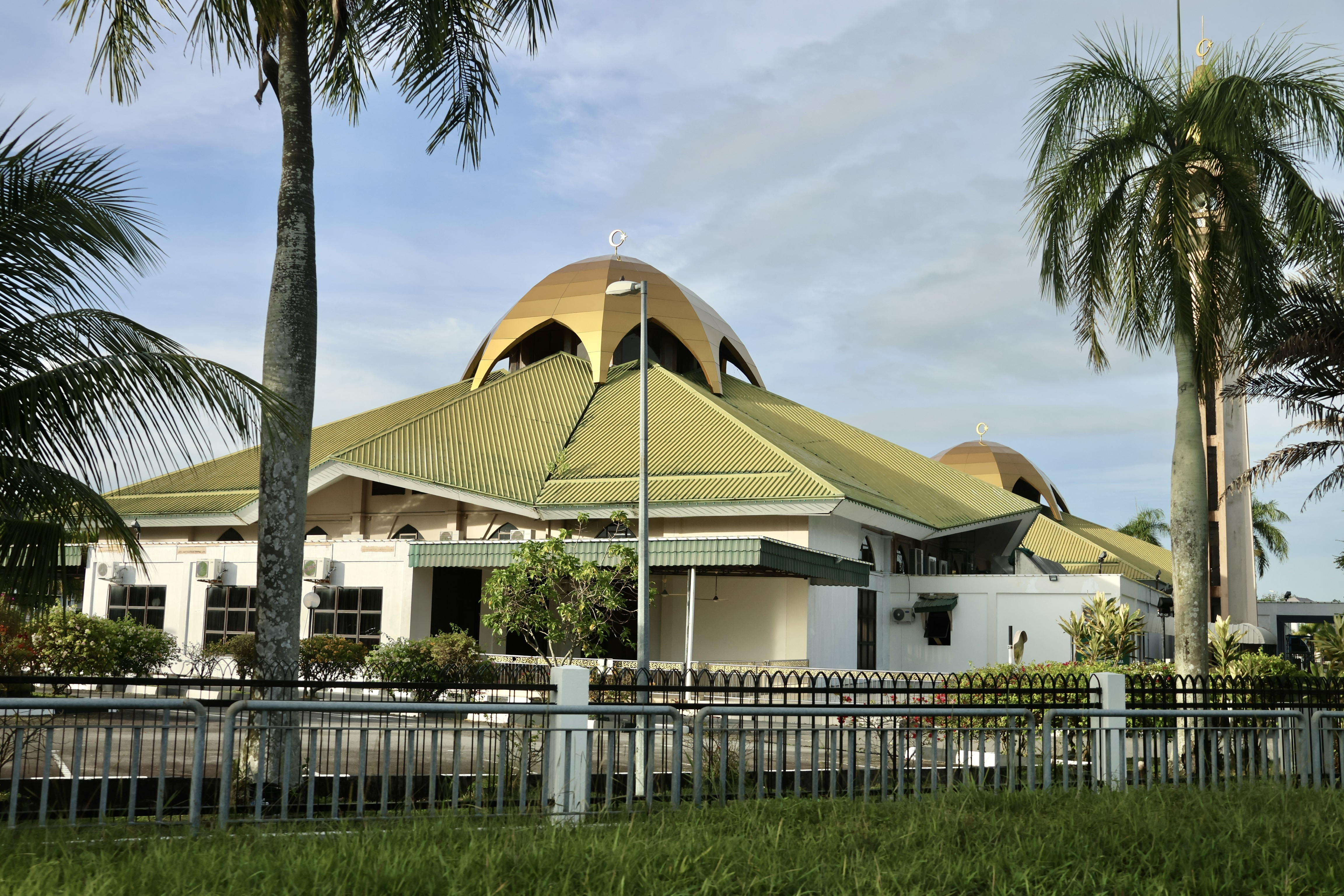Sharif Ali on:
[Wikipedia]
[Google]
[Amazon]
Sharif Ali (died ) or commonly known as Sultan Berkat (the Blessed Sultan), was the fourth sultan of Brunei from 1425 until 1432, the year of his alleged death. He ascended the Brunei throne in 1425, succeeding his father-in-law, Sultan
 In Kota Batu, next to the Brunei Museum, is allegedly Sharif Ali's tomb. A trail that connects his mausoleum with Sultan
In Kota Batu, next to the Brunei Museum, is allegedly Sharif Ali's tomb. A trail that connects his mausoleum with Sultan
 * Jalan Sharif Ali is a road in Seria
* Sultan Sharif Ali Islamic University is established on 1 January 2007
* Sultan Sharif Ali Mosque in Kampong Sengkurong
* Sultan Sharif Ali Secondary School in Kampong Salambigar
* Jalan Sharif Ali is a road in Seria
* Sultan Sharif Ali Islamic University is established on 1 January 2007
* Sultan Sharif Ali Mosque in Kampong Sengkurong
* Sultan Sharif Ali Secondary School in Kampong Salambigar
Ahmad
Ahmad () is an Arabic male given name common in most parts of the Muslim world. Other English spellings of the name include Ahmed. It is also used as a surname.
Etymology
The word derives from the root ( ḥ-m-d), from the Arabic (), from ...
, who had no male heir
Inheritance is the practice of receiving private property, titles, debts, entitlements, privileges, rights, and obligations upon the death of an individual. The rules of inheritance differ among societies and have changed over time. Offi ...
. He significantly strengthened Islam in Brunei through his various measures. His efforts not only enhanced his own stature but also benefited the entire Bruneian populace. By reinforcing Islamic principles, he further solidified the Malay Muslim Monarchic concept. As the first Sultan to construct a mosque in Brunei, he is regarded as a pious leader who governed the country in accordance with Islamic law
Sharia, Sharī'ah, Shari'a, or Shariah () is a body of religious law that forms a part of the Islamic tradition based on scriptures of Islam, particularly the Qur'an and hadith. In Islamic terminology ''sharīʿah'' refers to immutable, intan ...
.
Genealogy
Sharif Ali, anArab
Arabs (, , ; , , ) are an ethnic group mainly inhabiting the Arab world in West Asia and North Africa. A significant Arab diaspora is present in various parts of the world.
Arabs have been in the Fertile Crescent for thousands of years ...
of Taif
Taif (, ) is a city and governorate in Mecca Province in Saudi Arabia. Located at an elevation of in the slopes of the Hijaz Mountains, which themselves are part of the Sarat Mountains, the city has a population of 563,282 people in 2022, mak ...
descent, was a descendant of Muhammad
Muhammad (8 June 632 CE) was an Arab religious and political leader and the founder of Islam. Muhammad in Islam, According to Islam, he was a prophet who was divinely inspired to preach and confirm the tawhid, monotheistic teachings of A ...
through his grandson Hasan ibn Ali
Hasan ibn Ali (; 2 April 670) was an Alids, Alid political and religious leader. The eldest son of Ali and Fatima and a grandson of the Islamic prophet Muhammad, Hasan briefly ruled as Rashidun caliphate, Rashidun caliph from January 661 unt ...
. Known as Al-Amir Sharif 'Ali bin Sharif 'Ajlan bin Sharif Rumaithah bin Sharif Muhammad Abu Numaie Al-Awwal, and formerly the Emir of Mecca
The Sharif of Mecca () was the title of the leader of the Sharifate of Mecca, traditional steward of the Holiest sites in Islam, Islamic holy cities of Mecca and Medina. The term ''sharif'' is Arabic for "noble", "highborn", and is used to desc ...
, Sharif Ali's connection to Brunei is symbolised by the "Pedang Si Bongkok," a sword he brought with him. This sword is the sole unambiguous reference to his lineage from his father, Sharif Abu Numaie, and remains a cherished royal artifact in the palace.
Reign
Following the death of Sultan Ahmad without a male heir, the people of Brunei urged his son-in-law, the esteemed Arab missionary Sharif Ali, to ascend the throne. Known for his dedication to spreading Islam, Sharif Ali solidified his ties to the Bruneian royal family by marrying Sultan Ahmad's daughter, Puteri Ratna Kesuma, around 1400, when she was likely a teenager. This timeline aligns with Sharif Ali's arrival in Brunei after TH 797 ( AD 1395) and his ascension as sultan in TH 836 (AD 1432). Sharif Ali greatly advanced Islam in Brunei. Islamic teachings were firmly established in the Malay Muslim Monarchy during his reign, and Islamic laws—such as fasting for Muslims—were introduced while preserving local practices that were in line with Islam. His impact signaled the shift from earlierHindu
Hindus (; ; also known as Sanātanīs) are people who religiously adhere to Hinduism, also known by its endonym Sanātana Dharma. Jeffery D. Long (2007), A Vision for Hinduism, IB Tauris, , pp. 35–37 Historically, the term has also be ...
-Buddhist
Buddhism, also known as Buddhadharma and Dharmavinaya, is an Indian religion and List of philosophies, philosophical tradition based on Pre-sectarian Buddhism, teachings attributed to the Buddha, a wandering teacher who lived in the 6th or ...
influences to a unified Islamic civilisation and established the groundwork for Brunei's Islamic government. Along with establishing the first mosque
A mosque ( ), also called a masjid ( ), is a place of worship for Muslims. The term usually refers to a covered building, but can be any place where Salah, Islamic prayers are performed; such as an outdoor courtyard.
Originally, mosques were si ...
and affirming the ''qibla
The qibla () is the direction towards the Kaaba in the Great Mosque of Mecca, Sacred Mosque in Mecca, which is used by Muslims in various religious contexts, particularly the direction of prayer for the salah. In Islam, the Kaaba is believed to ...
'' direction, he provided Bruneian Muslims with a central space for communal worship, especially for Friday prayers. He would occasionally deliver the Friday sermon himself, uniting his roles as both ruler and preacher to uphold Islamic principles, a mission he had pursued since his arrival in Brunei. By adding Islamic symbolism to the royal regalia, especially the flag known as "''Tunggul Alam Bernaga''," Sharif Ali strengthened Islam in Brunei. The flag reflected the pinnacle of Islamic principles in Bruneian culture, with its three wings signifying the pillars of Islam: ''iman'', Islam, and ''ihsan
''Ihsan'' ( , also romanized ''ehsan'') is an Arabic term meaning "to do beautiful things", "beautification", "perfection", or "excellence" (Arabic: , ). ''Ihsan'' is a matter of taking one's inner faith ('' iman'') and showing it in both deed ...
''. "''Tunggul Alam Bernaga''" also represented the Sultan's might, his submission to Allah's will, and his defence of his subjects. Furthermore, he bestowed to Brunei the title "''Darussalam''" as a blessing and prayer, expressing a hope for the country's continued success.
As a result of the ennoblement of its tutelary mountain at Sharif Ali's request, Brunei and Malacca
Malacca (), officially the Historic State of Malacca (), is a States and federal territories of Malaysia, state in Malaysia located in the Peninsular Malaysia#Other features, southern region of the Malay Peninsula, facing the Strait of Malacca ...
became major kingdoms during his rule. When he was given burial arrangements comparable to those of the Sulu kings, this position was further confirmed. Through its embassies
A diplomatic mission or foreign mission is a group of people from a state or organization present in another state to represent the sending state or organization officially in the receiving or host state. In practice, the phrase usually denotes a ...
, Brunei obtained the ''changkah'', a rare ceremonial sword, during this period. Archaeological evidence indicates that Chinese builders were involved in the construction of the stone ramparts of "''Kota Batu''," which Sharif Ali designed and asked be built. The Bruneians, known as "islams" because they avoid eating pork, are said to have originated from a man named Sultan Yusuf, who some academics, like John S. Carroll, believe to be Sharif Ali, according to the Boxer Codex. Sultan Yusuf, who ruled Cavin, a city in the Malay-speaking area close to Mecca, departed his country in a number of ships with a large following. He fought against the indigenous Visayans
Visayans ( Cebuano: ''mga Bisayà'' ) are a Philippine ethnolinguistic family group or metaethnicity native to the Visayas, to the southernmost islands south of Luzon, and to a significant portion of Mindanao. They are composed of numerous d ...
after landing in Borneo
Borneo () is the List of islands by area, third-largest island in the world, with an area of , and population of 23,053,723 (2020 national censuses). Situated at the geographic centre of Maritime Southeast Asia, it is one of the Greater Sunda ...
, retaining his position as king and ruler over his subjects.
After his death, Sultan Bolkiah
Bolkiah ibni Sulaiman (Jawi script, Jawi: ; died 17 July 1524) or commonly known as Nakhoda Ragam (Jawi script, Jawi: ), was the sixth List of sultans of Brunei, sultan of Brunei from 1485 until his death in 1524, he ascended the throne upon t ...
and Sultan Muhammad Hasan continued his legacy, contributing to Brunei's political influence and commitment to Islam. His son, Pengiran Muda Besar Sulaiman, succeeded him as Sultan of Brunei.
His tomb and uncertainties
Bolkiah
Bolkiah ibni Sulaiman (Jawi script, Jawi: ; died 17 July 1524) or commonly known as Nakhoda Ragam (Jawi script, Jawi: ), was the sixth List of sultans of Brunei, sultan of Brunei from 1485 until his death in 1524, he ascended the throne upon t ...
's and passes other historically significant locations leads visitors to the tomb through a wooded region. The route continues in the direction of Kota Batu Archaeological Park, which are named for the remains of a stone fort that have been discovered there.
According to the Bruneian family tree, he died in 1432. This stems from the fact that a modest gravestone, dated A.H. 836 or A.D. 1432, next to the Brunei Museum in Kota Batu, was formerly believed to be his. However, upon closer inspection, it was discovered to be the grave of an Asueri who was neither a sultan nor a sharif
Sharīf or Sherif (, 'noble', 'highborn'), also spelled shareef, feminine sharīfa (), plural ashrāf (), shurafāʾ (), or (in the Maghreb) shurfāʾ, is a title used to designate a person descended, or claiming to be descended, from the fami ...
. In any event, this sultan's reign would have had to have taken place after 1515. His death date is unknown, and there is no custom that his grave is located in Brunei. It is possible to assume that he began his rule between 1521 and 1524, although this is only guesswork.
Things named after him
 * Jalan Sharif Ali is a road in Seria
* Sultan Sharif Ali Islamic University is established on 1 January 2007
* Sultan Sharif Ali Mosque in Kampong Sengkurong
* Sultan Sharif Ali Secondary School in Kampong Salambigar
* Jalan Sharif Ali is a road in Seria
* Sultan Sharif Ali Islamic University is established on 1 January 2007
* Sultan Sharif Ali Mosque in Kampong Sengkurong
* Sultan Sharif Ali Secondary School in Kampong Salambigar
Notes
References
Citations Bibliography * * * * * * * *External links
{{Sultans of Brunei Bruneian people of Saudi Arabian descent 20th-century sultans of Brunei 15th-century Arab people 1382 births 1432 deaths